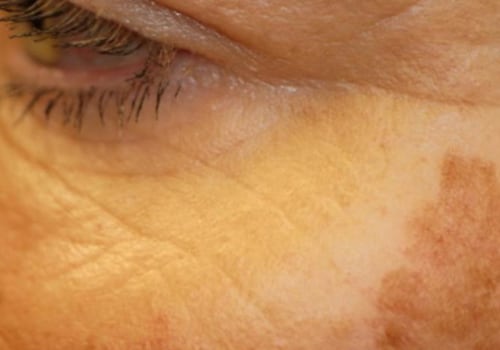Have you ever noticed your skin change color temporarily? You may have experienced temporary changes in skin color due to a variety of factors, from sun exposure to laser hair removal treatments. In this article, we will explore the different causes of temporary changes in skin color, and what you need to know about these changes. From sunburns to the aftermath of laser hair removal treatments, your skin can experience drastic color changes. But what is behind these temporary changes in skin color? And how can you safely manage them? Read on to learn more about temporary changes in skin color and what you need to know. The laser hair removal procedure works by using highly concentrated beams of light to target and destroy individual hair follicles. During the procedure, the skin may become temporarily darker or lighter due to the energy from the laser.
This is a common side effect and usually resolves itself within a few days or weeks. However, it is important to understand that there are some risks associated with this procedure and it is important to be aware of them before beginning treatment. For most people, the temporary changes in skin color are minimal and will only last for a few days after the procedure. However, some people may experience more dramatic changes that can last for several weeks or even months. In rare cases, the changes may be permanent. The most common cause of temporary changes in skin color is hyperpigmentation, which is when areas of skin become darker than normal due to an increase in melanin production.
This is caused by the laser energy stimulating melanin production, which can cause areas of skin to appear darker than normal. Hyperpigmentation is more common in those with darker skin tones. Another potential side effect is hypopigmentation, which is when areas of skin become lighter than normal due to a decrease in melanin production. This is caused by the laser energy damaging melanocytes, which are responsible for producing melanin. Hypopigmentation is more common in those with lighter skin tones. It is important to note that these side effects are not always permanent and may resolve themselves over time.
If you experience any changes in skin color following laser hair removal, it is best to speak to your doctor as soon as possible. They will be able to advise you on how to reduce the risk of these side effects occurring again in the future. The best way to reduce the risk of experiencing any side effects from laser hair removal is to make sure that you are properly prepared for the procedure. This includes protecting your skin from the sun before and after treatment, avoiding sun exposure for at least one week prior to treatment, and wearing sunscreen when outdoors. It is also important to follow all of your doctor’s instructions before and after treatment. If you experience any changes in skin color following laser hair removal, it is best to speak to your doctor as soon as possible.
They will be able to advise you on how to reduce the risk of these side effects occurring again in the future.
How Can I Reduce The Risk?
There are a few ways to reduce the risk of experiencing temporary changes in skin color following laser hair removal. By taking a few simple precautions, you can minimize the likelihood of any issues arising.Protect your skin from the sun
- Before and after treatment, be sure to use a high-quality sunscreen with an SPF of at least 30 when spending time outdoors. Additionally, avoid exposing your skin to the sun for at least one week prior to your laser hair removal appointment.Wear sunscreen
- When outdoors, always apply sunscreen to exposed areas of your skin. Even on cloudy days, ultraviolet rays can damage your skin and increase the risk of changes in skin color following laser hair removal.Avoid tanning beds
- Tanning beds should be avoided at all costs before and after laser hair removal.Not only can they cause serious skin damage, but they can also increase the risk of changes in skin color.
What Causes Temporary Changes in Skin Color?
When it comes to laser hair removal, temporary changes in skin color can occur due to the nature of the procedure. The two main types of pigment changes that can occur are hyperpigmentation and hypopigmentation. Hyperpigmentation is the darkening of an area of the skin, which is caused by an increase in melanin production. The most common cause of this is due to the heat generated by laser hair removal, which damages the melanocytes and causes them to produce more melanin.Hypopigmentation is the lightening of an area of skin, which is caused by a decrease in melanin production. This can be caused by the laser energy damaging the melanocytes, preventing them from producing as much melanin. Both hyperpigmentation and hypopigmentation are temporary, and should go away within a few weeks or months after the treatment. However, if you have darker skin, you may be more likely to experience these pigment changes, so it's important to talk to your doctor about any potential risks before undergoing the procedure.
It's also important to follow your doctor's advice for post-treatment care, such as avoiding direct sun exposure and using sunscreen to protect your skin. This will help reduce your risk of experiencing pigment changes. Laser hair removal is a common procedure that can cause temporary changes in skin color. It is important to be aware of the potential side effects of laser hair removal, and take steps to reduce your risk. If you experience any changes in skin color following laser hair removal, contact your doctor right away.
By understanding the risks and taking precautions, you can enjoy the benefits of laser hair removal with minimal side effects.







